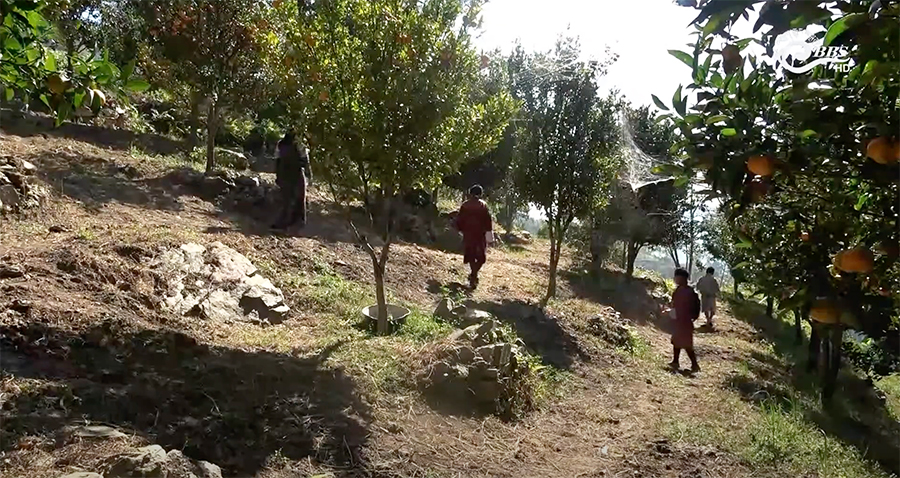 Orange, a cash crop in Maenchhuna village in Dagana’s Drujeygang Gewog, have been hit hard by the Chinese citrus fly, leading to reduced yields. However, orange growers have now joined forces to find ways to protect citrus from pests. The Maenchhuna Citrus Fruit Fly Management Group, recently formed, ensures that dropped fruits are collected and disposed of, offering hope for a healthier harvest.
Orange, a cash crop in Maenchhuna village in Dagana’s Drujeygang Gewog, have been hit hard by the Chinese citrus fly, leading to reduced yields. However, orange growers have now joined forces to find ways to protect citrus from pests. The Maenchhuna Citrus Fruit Fly Management Group, recently formed, ensures that dropped fruits are collected and disposed of, offering hope for a healthier harvest.
Citrus fruit drop or late fruit drop poses a threat to citrus with many pre-mature fruits dropping before harvest.
 The growers collect the infested oranges and discard them in designated pits.
The growers collect the infested oranges and discard them in designated pits.
 All 48 orange growers in the village along with 10 other growers from neighbouring Khebisa Gewog are the members of Maenchhuna Citrus Fruit Fly Management Group. They repeat the routine every day to improve fruit yields and sustain their livelihoods.
All 48 orange growers in the village along with 10 other growers from neighbouring Khebisa Gewog are the members of Maenchhuna Citrus Fruit Fly Management Group. They repeat the routine every day to improve fruit yields and sustain their livelihoods.
“Mandarin growers must take the initiative to tackle the fruit drop problem. We realised that attending training without taking action would not solve anything. So, we started weekly inspections, hoping to manage the issue effectively,” said Tshering Tashi, Chairman of Maenchhuna Citrus Fruit Fly Management Group.
 A five-member team visits the Mandarin orchards for weekly inspection. Since its inception in October this year, no one has been found negligent.
A five-member team visits the Mandarin orchards for weekly inspection. Since its inception in October this year, no one has been found negligent.
The group has penalties in place for defaulters. Orchard owners with more than one acre of land face fines of Nu 10,000, while smaller orchards are fined Nu 5,000. The amounts will be doubled for repeat offenders.
“Unlike before, we rarely see dropped mandarins now. Most growers are serious about the initiative, although larger orchard owners find it difficult to collect all dropped fruit within a week. Still, they cooperate when asked,” said Duba, a community inspector.
“It’s difficult for some growers in the first year, but we expect better compliance next year. We’ve been constantly reminding them to take care of dropped fruits,” said Zam, another community inspector.
Members are hopeful that the initiative will solve the fruit drop issue.Jigme Lhamo, an orange grower said, “Initially, my orchards were full of fruit. But over time, much of it dropped. This year, I lost over a truckload of mandarins from my three orchards. Without the drop, I could have earned around Nu 1.2 M.” “Though my trees aren’t fully grown, I make sure all dropped fruit is picked up and properly disposed of. As a community inspector, I must set a good example and encourage others, even those with just a few trees,” said another grower, Tshewang Dorji.
Agriculture officials say the fruit drop is caused by Chinese fruit flies. They say that initiatives like this are one of the most cost-effective ways to combat the problem.
To determine the impact, the Gewog Agriculture Extension Supervisor will be assessing the orange orchard for the next five years.
“If a mandarin tree has six fruit flies—three males and three females—one female can lay up to 1,000 eggs in a cycle, causing rapid multiplication. Measures like picking up and disposing of affected fruits can significantly reduce their population, possibly making orchards fruit-fly-free one day,” said Tshering Dendup, Sr. Gewog Agriculture Supervisor, Drujeygang Gewog.
 The harvest season is at its peak in the village. Exporters say they face huge losses every year due to fruit drop.
The harvest season is at its peak in the village. Exporters say they face huge losses every year due to fruit drop.
“I paid 600,000 ngultrum for an orchard but earned only Nu 300,000 from it. I booked another orchard for Nu 500,000 , but I lost 280,000. The orchard owners won’t cover my losses, just as I don’t share my profits—our deals are finalised,” said Sangay Zam, an orange exporter.
If the initiative in Maenchhuna proves successful, it could serve as a model for mandarin growers across Bhutan to address the citrus fruit drop problem effectively.
Pema Tshewang, Dagana
Edited by Sangay Chezom









